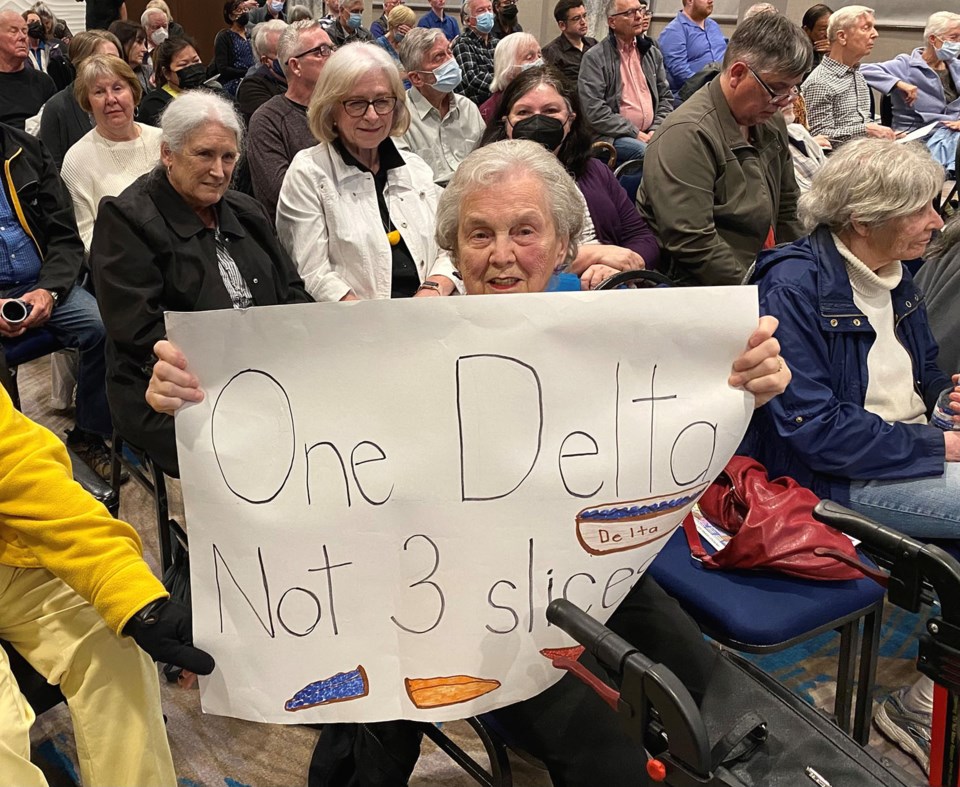Leave Delta alone.
That was the major theme conveyed to the three panel members of the Federal Electoral Boundaries Commission at a public hearing Thursday regarding a proposal to redraw the electoral boundaries for the Delta riding.
More than 100 residents attended the meeting at the Coast Tsawwassen Inn and those who signed up to speak reiterated concerns about Delta losing effective representation in Parliament, a result of the current single riding being carved into three and the city’s residents becoming a minority in new ridings that would be lumped into Richmond and Surrey.
“With the proposed amendments, North Delta, which is home to more than half of Delta’s population, would be split between Richmond East and Surrey West,” said Mayor George Harvie. “Our constituents in North Delta would become minority voices represented by neighbouring municipalities which have their own and very different issues and very different priorities. Effective political representation would be lost. At the same time, our residents in South Delta would be joined by some 50,000 residents from West Surrey with very different demographics and issues and priorities.”
Coun. Dylan Kruger reiterated concerns that without a single member of Parliament, Delta’s unique and specific issues won’t be addressed.
Others echoed those concerns, adding the city is not far off of a new 116,000 population quota for ridings and that projected population growth in the community, as well as Tsawwassen First Nation, would keep Delta very much in line with the required number.
One speaker, a Richmond resident, told the panel that Richmond East “has no business” representing Delta, while others said the city would lose a strong advocate on issues, and the current configuration is working well.
Delta’s MP Carla Qualtrough also made a presentation, noting the community does not need to be unnecessarily fragmented. She warned Delta would lose quality of service, outreach and advocacy tailored for the community and that Delta’s priorities would not be the same as the other cities.
Qualtrough also highlighted examples of how ridings now are competing for funding for projects and that Delta would end up on the losing end.
She suggested the panel look for creative ways to keep Delta intact.
Saying that the proposed artificial boundaries make no sense and would lessen Delta’s representation in Ottawa, resident Roger Emsley warned it would create confusion while ignoring Delta’s unique history, culture and issues.
He also warned residents would likely not bother to vote, urging the panel, “If it isn’t broke, don’t fix it.”
Representing Delta South MLA Ian Paton, constituency assistant Taylor Grant warned the carving up of Delta would impact services and make it much more difficult for people trying to navigate various levels of government.
Others noted the city and school district would end up having to deal with three different MPs on issues.
Several also conveyed similar concerns when it comes to seniors, one speaker saying a community and its needs should be the prime consideration instead of lines on a map.
Former Delta South MLA Vicki Huntington agreed, saying numbers and drawing lines on a map doesn’t make for good representation.
Noting North Delta residents don’t want to be a small part of Richmond or Surrey, another speaker said an MP representing a majority elsewhere won’t have a grasp of Delta’s issues, and that Delta would end up “being in a galaxy far, far away” for those MPs.
Rather than carving up federal electoral boundaries in order to create one new one in B.C., another suggested Ottawa should instead focus on providing more funding for MP’s to adequately represent their current ridings and their unique needs.
Representing the Delta Chamber of Commerce, Optimist publisher and chamber director Pierre Pelletier outlined several concerns when it comes to the business community, including an increase in inefficiencies, how the move would be unnecessary due to population growth and that the proposed changes would result in Richmond residents making determinations on Delta’s industrial activities.
Previously, the municipality was split with the ridings of Delta-Richmond East and Newton-North Delta, but in 2015 a reconfiguration resulted in Delta becoming its own, single riding.
That could change as the commission is proposing a new riding called Delta that would see Ladner, Tsawwassen and North Delta below 72 Avenue join part of Surrey, extending all the way to King George Highway.
Another part of North Delta would be lumped into Surrey as part of a Surrey riding, while another area of North Delta and the River House area of Ladner would join a newly reconfigured Richmond East.
Noting they will consider the input of residents from the series of hearings now underway before coming up with final recommendations, Justice Mary Saunders, chair of the three-member commission, told the audience Thursday it’s mandated that federal electoral boundary reviews occur every decade as population numbers change and to maintain balance.
She said the objective is to keep as close to an electoral quota as can be reasonably possible.
Saunders said Richmond’s two ridings need additional people to create fairness and balance out with other ridings now “bulging with people.”
For more information about the proposed electoral boundary changes, the public hearings or submitting comments, check out: redistribution2022.ca.




